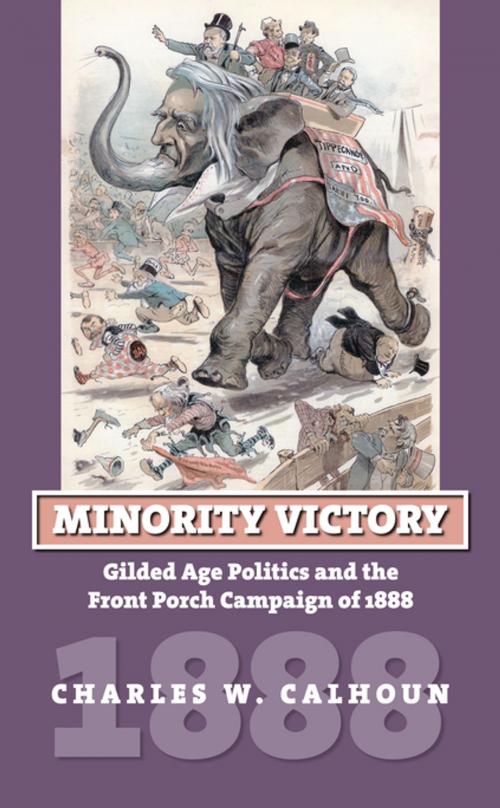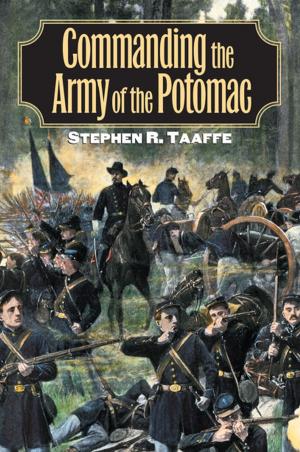Minority Victory
Gilded Age Politics and the Front Porch Campaign of 1888
Nonfiction, Social & Cultural Studies, Political Science, Government, Elections, Politics, History & Theory, History, Americas, United States, 19th Century| Author: | Charles W. Calhoun | ISBN: | 9780700625970 |
| Publisher: | University Press of Kansas | Publication: | August 22, 2017 |
| Imprint: | University Press of Kansas | Language: | English |
| Author: | Charles W. Calhoun |
| ISBN: | 9780700625970 |
| Publisher: | University Press of Kansas |
| Publication: | August 22, 2017 |
| Imprint: | University Press of Kansas |
| Language: | English |
During the run-up to the 1888 presidential election, Americans flocked to party rallies, marched in endless parades, and otherwise participated zealously in the political process. Although they faced a choice between two uncharismatic candidates—Republican challenger Benjamin Harrison and Democratic incumbent Grover Cleveland—voters took intense interest in the issues they espoused. And though Harrison became one of only four candidates to win the presidency while losing the popular vote, the lasting significance of the election was its foreshadowing of both the modern campaign and the modern presidency.
Charles W. Calhoun shows how this presidential contest not only exemplified Gilded Age politics but also marked a major shift from divisive sectional rhetoric to an emphasis on voters' economic concerns. Calhoun first explores Cleveland's rise to the presidency and explains why he turned to economic issues, especially tariff reduction, in framing his bid for reelection. He then provides a detailed analysis of the raucous Republican national convention and describes Harrison's effective front porch campaign, in which he proclaimed his views almost daily to visiting voters and reporters. Calhoun also explores the role of party organizations, business interests, labor, women, African Americans, and third parties in the campaign; discusses alleged fraud in the election; and analyzes the Democrats' suppression of black votes in the South.
The 1888 campaign marked an important phase in the evolution of American political culture and augured significant innovations in American politics and governance. The Republicans' performance, in particular, reflected the party's future winning strategies: emphasis on economic development, personal participation by the presidential candidate, a well-financed organization, and coordination with beneficiaries of the party's agenda.
Harrison set important precedents for campaigning and then, once in office, fashioned new leadership strategies and governing techniques—emphasizing legislative intervention, extensive travel, and a focus on foreign affairs-that would become the stock-in-trade of later presidents. His Republican successors built upon these transformations, making the GOP the majority party for a generation and putting the presidency at the center of American governance—where it has remained ever since.
During the run-up to the 1888 presidential election, Americans flocked to party rallies, marched in endless parades, and otherwise participated zealously in the political process. Although they faced a choice between two uncharismatic candidates—Republican challenger Benjamin Harrison and Democratic incumbent Grover Cleveland—voters took intense interest in the issues they espoused. And though Harrison became one of only four candidates to win the presidency while losing the popular vote, the lasting significance of the election was its foreshadowing of both the modern campaign and the modern presidency.
Charles W. Calhoun shows how this presidential contest not only exemplified Gilded Age politics but also marked a major shift from divisive sectional rhetoric to an emphasis on voters' economic concerns. Calhoun first explores Cleveland's rise to the presidency and explains why he turned to economic issues, especially tariff reduction, in framing his bid for reelection. He then provides a detailed analysis of the raucous Republican national convention and describes Harrison's effective front porch campaign, in which he proclaimed his views almost daily to visiting voters and reporters. Calhoun also explores the role of party organizations, business interests, labor, women, African Americans, and third parties in the campaign; discusses alleged fraud in the election; and analyzes the Democrats' suppression of black votes in the South.
The 1888 campaign marked an important phase in the evolution of American political culture and augured significant innovations in American politics and governance. The Republicans' performance, in particular, reflected the party's future winning strategies: emphasis on economic development, personal participation by the presidential candidate, a well-financed organization, and coordination with beneficiaries of the party's agenda.
Harrison set important precedents for campaigning and then, once in office, fashioned new leadership strategies and governing techniques—emphasizing legislative intervention, extensive travel, and a focus on foreign affairs-that would become the stock-in-trade of later presidents. His Republican successors built upon these transformations, making the GOP the majority party for a generation and putting the presidency at the center of American governance—where it has remained ever since.















